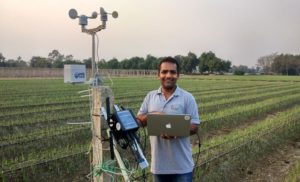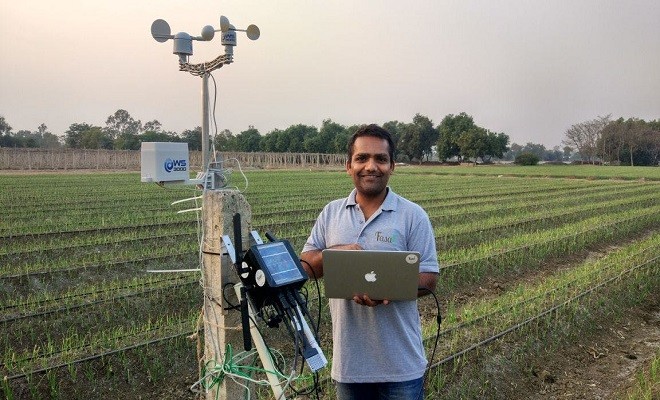Wolkus Solutions Technology Pvt. Ltd. is a Bangalore-based IoT company serving Smart Agriculture as a Creator through FASAL, its AI-powered IoT platform for Agriculture ecosystem and end-to-end implementation services. Mr Ananda Prakash Verma, Founder & CEO of Wolkus Technology discusses IoT business in India, government policies and how the government initiatives can help accelerate the IoT ecosystem.
Q. Many opine that IoT is just a buzzword that industry Gurus have coined to create hype. Do you agree with that line of thought or you feel that IoT is opening an entirely new market?

I strongly believe that IoT is opening an entirely new market across all the verticals. The development of low-cost sensors, cloud-based data management platforms and new forms of connectivity is boosting IoT development and adoption. The solutions are also creating new revenue streams, transforming business models and opening up unforeseen commercial opportunities.
Q. Is the Government of India playing a significant role in expanding the IoT market right now?
The government of India is playing a very crucial role in the development and progression of IoT. The Ministry of Electronics and Information Technology (MeitY) recently released a draft policy related to IoT plans. The goal is to create an IoT industry of $ 15 billion by 2020. India is expected to gain a 5-6 per cent share in the global IoT market.
The IoT Policy has proposed the implementation via a multi-pillar approach comprising five vertical pillars – Demonstration Centres, Capacity Building & Incubation, R&D and Innovation, Incentives and Engagements, Human Resource Development and two horizontal supports – Standards and Governance structure. The CoE-IoT incubation centre in Bengaluru where FASAL was being incubated is one such example.
FASAL is an AI-powered IoT platform for agriculture ecosystem that records a variety of growing conditions on the farm. It uses artificial intelligence and data science to make on-farm predictions and delivers the actionable insights to farmers on the mobile phone. FASAL helps farmers in reducing the input cost in terms of water, pesticide, insecticide and also improving the production hence increasing per acre income of the farmer. FASAL is working towards Govt. of India initiative of doubling the farmer income.
Q. What are your expectations from the government in terms of the initiatives they should take to make India an IoT superpower?
The government of India should identify – value adding and scalable start-ups in IoT, make strategic investments and explore collaborations. Apart from building R&D and incubation centres. There are IoT start-ups that are doing fantastic work, but they are seeking investments and support from other countries because of lack of support and transparency from the government-initiated bodies.
Q. Are you satisfied with the rate of deployment of IoT solutions in India?
The time is yet to come. I believe the current IoT market in India is very fragmented and hence there are very few players who are disrupting any sector in IoT. We need to collaborate and work. This is how I believe the deployment rate would increase.
Q. How do you see the IoT market evolving in the next 2-3 years?
I see a great potential in the IoT market. I think it will evolve multiple-fold in India and abroad in the coming 2-3 years. Sectors such as Agriculture and Healthcare that are still niche will evolve as the IoT solutions start becoming a commodity. Industrial IoT solutions are already evolving and we can expect more progress in the next 2-3 years.
Q. Which industry segments do you believe will be driving a larger chunk of demand? Why?
I think the smart homes, healthcare and agriculture segments will be driving the larger chunk of IoT demands in India. The reason being its market size, impact and the potential to grow in the future.
Q. What is your bigger challenge – acquiring customers or acquiring talent? What is your strategy in resolving the same?
We work in smart agriculture and it is a challenge in acquiring customers. Farmers do not want technology. They want solutions to help them save cost and increase production. Farming has been traditional guesswork for a very long time and it will take time to shift to the data-driven techniques. But yes, despite all the challenges we are making it happen because we understand the whole ecosystem. We sit with them and try to understand the real problems they are facing which technology like IoT can solve. Rather than building technology for them, we are building a solution for farmers’ pressing problems.
Q. What fraction of your overall business is IoT-related?
About half of Wolkus Technology’s business is IoT-related.
Q. What is your strategy to create a differentiation for your solutions vis-a-vis your competitors?
Our strategy is simple. Focus on solving the core issues and provide farmers a solution. We, as a platform, are always open to integrating new IoT hardware and remain an intelligence provider. We are soon going to make Agriculture IoT hardware a commodity to achieve the scale we vision.
Q. Any innovative strategy being planned or implemented by your team to create demand for your solutions among customers or channel partners?
Yes. We are planning on a unique strategy through which our prospective customers will see Return of Investments (ROI) within a week. This is something which drives us.
Q. Who is the key decision maker for you – the technology decision maker or the business decision maker? With whom do you start the conversation and how do you balance the interests of both types of decision makers?
I believe the business decision maker is the key decision maker. However, it is limited by technological intervention. So, there is always a fine balance.









